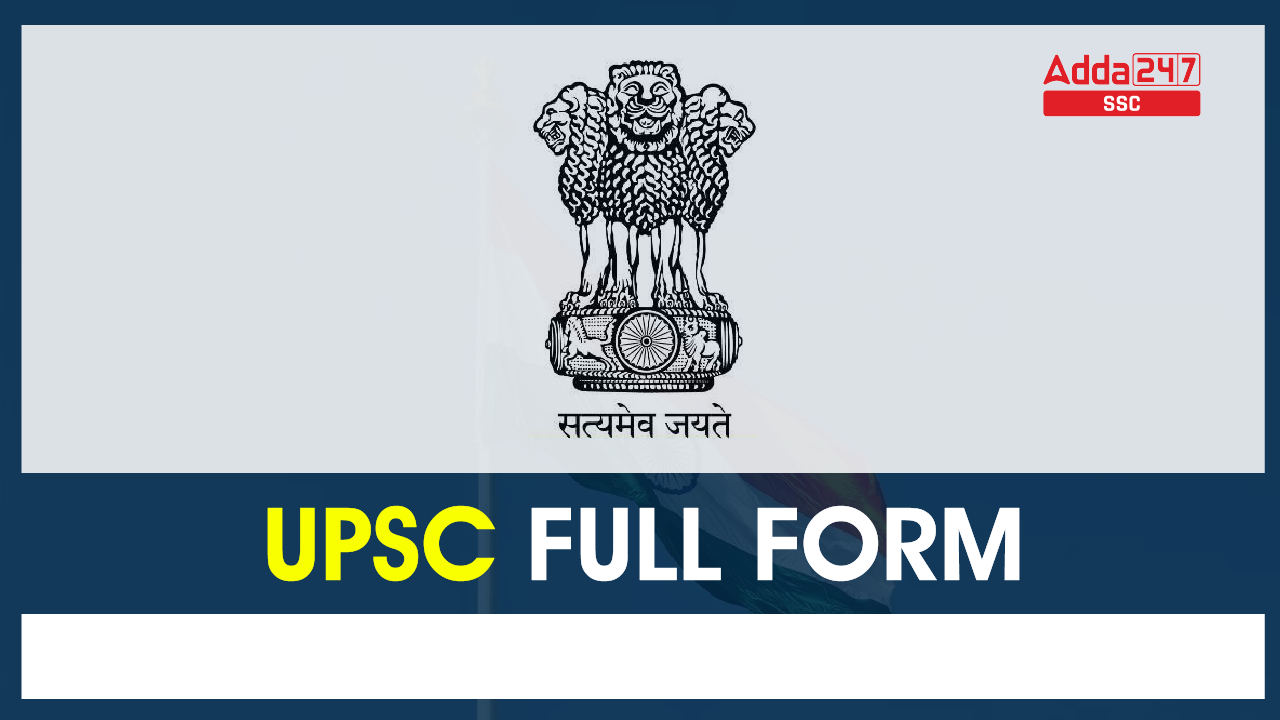Table of Contents
The full form of the acronym UPSC is Union Public Service Commission. It was established on 01st October 1926 as a constitutional body. The UPSC acts as the central recruiting authority of India for officers under the Government of India. Lakhs of aspirants compete every year for the recruitments notified by the UPSC. It is considered one of the toughest examinations in India for securing a gazetted central government post.
| Organization | UPSC |
|---|---|
| UPSC Full-Form | Union Public Service Commission (UPSC) |
| Group of posts under UPSC | Group A and B posts |
| Official website | upsc.gov.in |
| Exam mode | Offline |
| Minimum eligibility criteria | Graduate in concerned stream/ 12th Pass |
| UPSC Chairman | Pradeep Kumar Joshi |
UPSC Full Form and History
UPSC’s full form is Union Public Service Commission, as already mentioned above. Let us discuss about the origin or history of the UPSC.
The concept of a merit-based modern Civil Service exam in India was introduced in 1854 by the British East India Company. Initially, the examinations for the Indian Civil Service were conducted only in London and the syllabus was designed in such a way that only the British candidates could succeed in it. Nevertheless, in 1864, the first Indian, Shri Satyendranath Tagore brother of Shri Rabindranath Tagore succeeded.
It was only after the First World War and the Montagu Chelmsford reforms that Indian civil service exams began to be held in India. The Public Service Commission was set up in India for the first time on October 1, 1926. Sir Ross Barker, a member of the Home Civil Service, United Kingdom was the first Chairman of the Commission.
With the introduction of the Constitution of India on January 26, 1950, the Federal Public Service Commission came to be recognized as the Union Public Service Commission (UPSC). Hence, UPSC was formed as the central commission for conducting government job examinations.
The UPSC conducts various examinations, including the Civil Services Examination (CSE), which is considered one of the most prestigious examinations in India. The CSE is conducted annually and provides a gateway to the Indian Administrative Service (IAS), Indian Police Service (IPS), Indian Foreign Service (IFS), and other central services.
Over the years, the UPSC has evolved and adapted to changing circumstances and demands. The commission consists of a Chairman and other members appointed by the President of India. The Chairman and members hold office for a term of six years or until they attain the age of 65 years, whichever is earlier. The UPSC operates independently and is responsible for maintaining the integrity and impartiality of the recruitment process.
What are the Functions of UPSC?
The functions of the UPSC as mentioned in Article 320 of the Constitution include the following:
- Conduct the recruitment examinations for appointment to the services of the Union.
- Direct recruitment of aspirants by selection through interviews.
- Appointment of officers in the cadre on promotion/deputation/absorption.
- Framing and amendment of the Recruitment Rules for services and posts under the Government.
- Managing disciplinary cases related to different Civil Services or officers.
- Advising the Government on any matter assigned to the Commission by the President of India.
Which examinations are conducted by UPSC?
To understand UPSC, you must know the examinations conducted by the UPSC. Here is the list of exams conducted by UPSC:
- National Defence Academy and Naval Academy Examination (NDA)
- Indian Statistical Service Examination (ISS)
- Indian Economic Service Examination (IES)
- Indian Forest Service Examination (IFS)
- Combined Geo-Scientist and Geologist Examination
- Indian Civil Services Examination (ICSE) for recruitment to IAS, IPS, IRS, etc officers
- Indian Engineering Services Examination
- Combined Medical Services Examination
- Central Armed Police Forces (ACs) Examination
- Combined Defence Services Examination (CDS)
- Various Recruitment Tests for UPSC EPFO, other exams
What are the Minimum Qualifications for appearing for UPSC Exams?
If you are planning to apply for any of the mentioned examinations by UPSC, you must know about the minimum educational qualifications required by the particular exams. Check out below:
| Examination | Minimum Qualifications Required |
|---|---|
| National Defence Academy and Naval Academy Examination (NDA) | 12th pass |
| Indian Statistical Service Examination (ISS) | Bachelor’s Degree with Statistics/Applied Statistics/Mathematical Statistics |
| Indian Economic Service Examination (IES) | Post-Graduate Degree in Economics/Applied Economics/Business Economics etc |
| Indian Forest Service Examination (IFS) | Bachelor’s degree in any one of the mentioned subjects. |
| Combined Geo-Scientist and Geologist Examination | Master’s degree in mentioned subjects |
| Indian Civil Services Examination (ICSE) for recruitment to IAS, IPS, IRS etc officers | Bachelor’s degree in any subject. |
| Indian Engineering Services Examination | Degree in Engineering |
| Combined Medical Services Examination | MBBS |
| Central Armed Police Forces (ACs) Examination | Bachelor’s degree |
| Combined Defence Services Examination (CDS) | Bachelor’s degree |
UPSC CSE Exam
UPSC Civil Services exam consists of 3 stages passing which a candidate will be appointed for the posts under administrative departments:
- Preliminary examination
- Mains examination
- Interview
UPSC Preliminary examination
It consists of 2 mandatory papers for 200 marks each to be attempted in 2 hours. Paper 1 contains questions from General Studies (GS) while paper 2 is from the Aptitude Test.
| Paper | Subject | Marks | Duration |
|---|---|---|---|
| Paper 1 | General Studies (GS) | 200 marks | 2 Hours |
| Paper 2 | Aptitude Test | 200 marks | 2 Hours |
UPSC Mains examination
The Mains exam consists of subjective type questions with a total of 9 papers with 2 papers that are qualifying in nature while the marks scored in 7 papers are added in the final merit. Each paper is of 3 hours duration.
| Paper | Subject | Marks |
|---|---|---|
| Paper-A (Qualifying) |
One of the Indian Languages to be selected by the candidate | 300 marks |
| Paper-B (Qualifying) |
English | 300 marks |
| Paper-I | Essay | 250 Marks |
| Paper-II General Studies-Indian |
Indian Heritage and Culture, History and Geography of the World and Society | 250 Marks |
| Paper-III General Studies -II |
Governance, Constitution, Polity, Social Justice and International relations | 250 Marks |
| Paper-IV General Studies -III |
Technology, Economic Development, Bio-diversity, Environment, Security and Disaster Management | 250 Marks |
| Paper-V General Studies -IV |
(Ethics, Integrity, and Aptitude)- 250 Marks | 250 Marks |
| Paper-VI | Optional Subject Paper 1 | 250 Marks |
| Paper-VII | Optional Subject Paper 2 | 250 Marks |
Click here to get the best UPSC Study Material, Test Series, and More



 SSC CGL 2025: Will the Number of Vacanci...
SSC CGL 2025: Will the Number of Vacanci...
 RRB ALP Preparation Strategy 2025, Tips ...
RRB ALP Preparation Strategy 2025, Tips ...
 SSC CGL 2025: Why It Will Be the Most Co...
SSC CGL 2025: Why It Will Be the Most Co...


